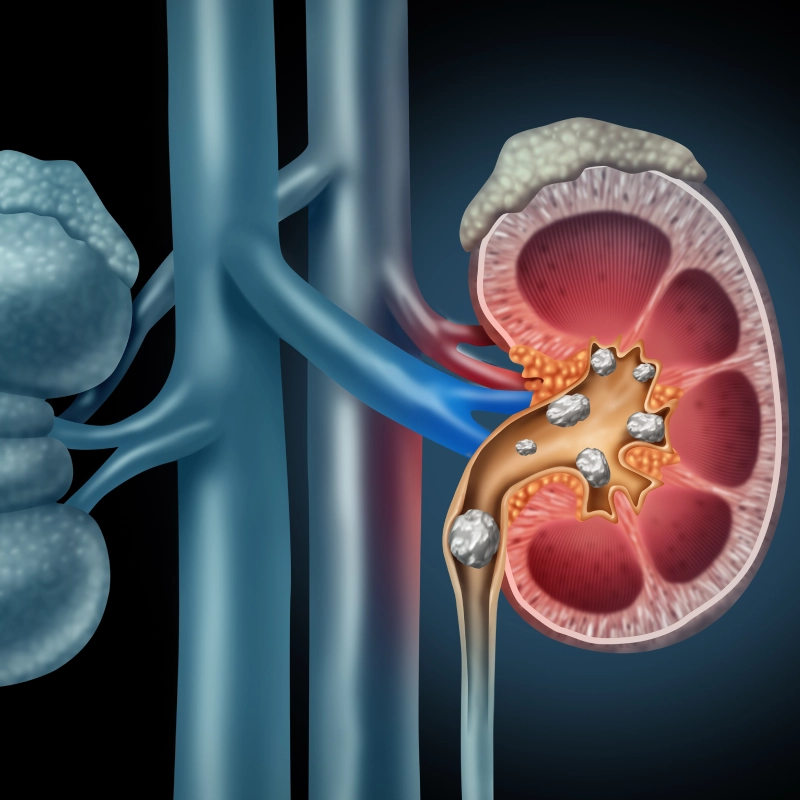
Kidney stones, solid deposits of minerals and salts that form in the kidneys, can cause intense pain and discomfort. While severe cases may require medical intervention, several home remedies can help manage and even prevent kidney stones.
Understanding Kidney Stones
Kidney stones are hard deposits formed from minerals and salts in the urine. They can vary in size and may cause severe pain when passing through the urinary tract. Common types of kidney stones include calcium stones, uric acid stones, struvite stones, and cystine stones.
Home Remedies for Kidney Stones
- Stay Hydrated
- Importance: Drinking plenty of water is crucial for preventing kidney stones and helping them pass. Hydration dilutes the substances in urine that lead to stones.
- Recommendation: Aim for at least 8-10 glasses of water daily. Clear or light-colored urine indicates proper hydration.
- Lemon Juice
- Benefits: Lemons contain citric acid, which can help break down calcium-based kidney stones and prevent new ones from forming.
- Usage: Add freshly squeezed lemon juice to water and drink throughout the day. Lemon juice can also be added to tea or other beverages.
- Apple Cider Vinegar
- Benefits: Apple cider vinegar contains acetic acid, which helps dissolve kidney stones.
- Usage: Mix 1-2 tablespoons of apple cider vinegar with water and drink this mixture once or twice daily. It can also help relieve pain and prevent stone formation.
- Basil Juice
- Benefits: Basil contains acetic acid, which aids in breaking down kidney stones and reducing pain. It also supports kidney health.
- Usage: Drink basil tea or juice made from fresh basil leaves. Chewing basil leaves can also be beneficial.
- Pomegranate Juice
- Benefits: Pomegranates have astringent properties and antioxidants that improve kidney health and help pass kidney stones.
- Usage: Drink fresh pomegranate juice daily. Eating the seeds can also be beneficial.
- Celery Juice
- Benefits: Celery juice is known to clear toxins that contribute to kidney stone formation. It has been used in traditional medicine for treating kidney stones.
- Usage: Blend fresh celery and strain the juice. Drink this juice once daily to prevent and treat kidney stones.
- Kidney Bean Broth
- Benefits: Kidney beans contain magnesium, which helps reduce symptoms associated with kidney stones.
- Usage: Boil kidney beans until soft, strain the liquid, and drink the broth. This can help improve overall kidney health and ease the passage of stones.
- Dandelion Root Juice
- Benefits: Dandelion root promotes bile production and helps eliminate waste, improving kidney function.
- Usage: Make tea from dandelion root or take it as a supplement after consulting a healthcare provider.
- Wheatgrass Juice
- Benefits: Wheatgrass juice increases urine flow and helps expel kidney stones. It contains essential nutrients that cleanse the kidneys.
- Usage: Drink 2-8 ounces of wheatgrass juice daily. It can also be mixed with lemon juice for added benefits.
- Horsetail Juice
- Benefits: Horsetail has diuretic properties that increase urine flow and reduce edema, helping flush out kidney stones.
- Usage: Drink horsetail tea or take it in supplement form after consulting with a healthcare provider.
Preventive Measures
- Limit Salt and Sugar Intake: Reducing the consumption of salt and sugar can help prevent kidney stones. Excess salt can lead to the formation of calcium stones, while high sugar levels can increase the risk of kidney stones.
- Reduce Oxalate-Rich Foods: Foods high in oxalates, such as spinach, beets, and nuts, can contribute to the formation of calcium oxalate stones. Limiting these foods may help prevent kidney stones.
- Increase Calcium Intake: Paradoxically, a diet low in calcium can lead to kidney stones. Consuming calcium-rich foods can help prevent stones by binding to oxalate in the intestines and preventing its absorption.
- Maintain a Healthy Weight: Obesity is a risk factor for kidney stones. Maintaining a healthy weight through diet and exercise can help reduce the risk of stone formation.
When to See a Doctor
While home remedies can be effective, it is essential to seek medical attention if:
- Pain is severe and persistent
- There is blood in the urine
- You experience fever and chills
- Difficulty passing urine
These symptoms may indicate a larger stone or an infection requiring medical intervention.
Conclusion
Kidney stones can be painful and disruptive, but several home remedies can help manage symptoms and promote the passing of stones. Staying hydrated, incorporating beneficial juices, and making dietary adjustments can significantly impact kidney health. Always consult with a healthcare provider before starting any new treatment, especially if you have underlying health conditions.
FAQs
1. How long does it take to pass a kidney stone?
The time it takes to pass a kidney stone varies. Small stones may pass within a few days to a couple of weeks, while larger stones may take longer and may require medical intervention.
2. Can children get kidney stones?
Yes, although kidney stones are more common in adults, children can also develop them. Factors such as diet, genetics, and certain medical conditions can increase the risk in children.
3. Do certain foods cause kidney stones?
Yes, certain foods high in oxalates, such as spinach, nuts, chocolate, and tea, can increase the risk of kidney stones in susceptible individuals. A diet high in protein, sodium, and sugar can also contribute to stone formation.
4. Can dehydration lead to kidney stones?
Yes, dehydration is a major risk factor for kidney stones. When you are dehydrated, your urine becomes more concentrated, increasing the likelihood of crystal formation.
5. What are the different types of kidney stones?
There are several types of kidney stones, including calcium stones (calcium oxalate and calcium phosphate), uric acid stones, struvite stones (associated with infections), and cystine stones (related to a genetic disorder).

